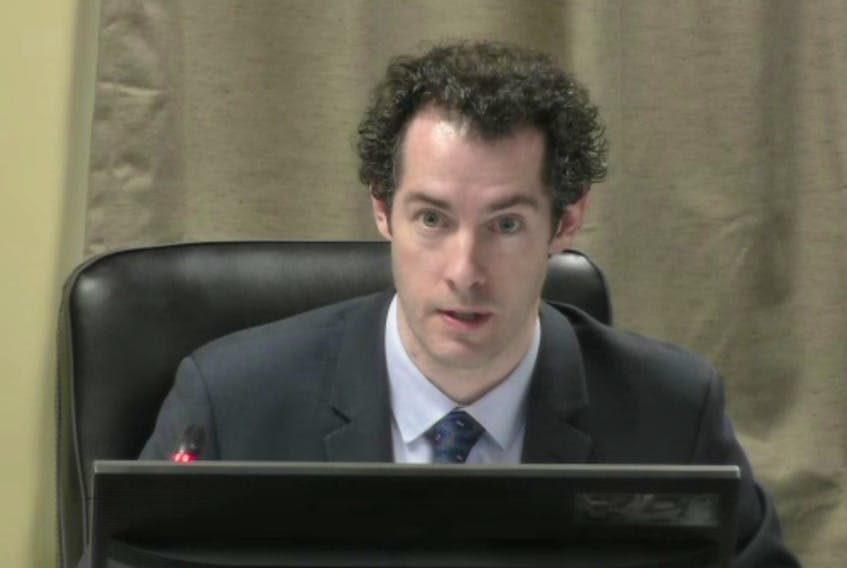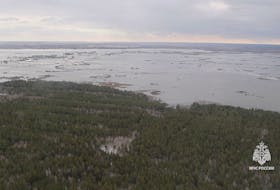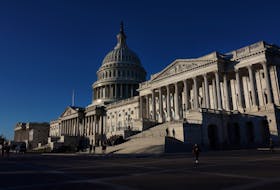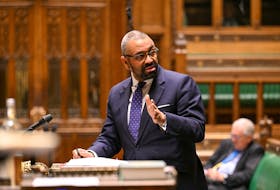ST. JOHN'S, N.L. — Rising costs for the Muskrat Falls megaproject were not always communicated as quickly as they could have been as the project progressed, Nalcor Energy vice-president of finance Jim Meaney testified at the Muskrat Falls Inquiry, beginning Thursday afternoon and continuing all day Friday.
Inquiry co-counsel Barry Learmonth probed comments about “sign-off” being required from former Nalcor Energy president and CEO Ed Martin before cost and schedule information was shared, even with the Government of Canada.
Learmonth asked if Martin had “absolute control” over the flow of the information.
“In terms of the decision on cost updates? Yes,” Meaney said. “That was the understanding within the organization.”
Meaney was questioned in detail on the lag between when the project team became aware costs were going to increase, when costs actually increased and when those cost increases were communicated to the Nalcor board, governments and the public.
He testified he did not become aware of a change in the estimated capital cost from $6.2 billion until the same month the project’s financial arrangements were to be signed.
The project ended up at a capital cost of $6.5 billion at close, in November 2013. That information wasn’t shared with the public.
Former Natural Resources Minister Derrick Dalley has testified he was in the dark at the time on the change, and believes the provincial government was not aware.
While on the stand, Meaney pointed to notes in evidence from Nalcor’s chief financial officer Derrick Sturge, indicating there was an update meeting with bureaucrats from the government present. Meaney said he wasn’t in that meeting, and suggested further questions be put to some of the witnesses coming later in the inquiry schedule.
Meanwhile, by February 2014, Meaney began work on a memo about the move from a capital cost of $6.2 billion to $6.5 billion and the known financing costs, only to have the project team inform him that they were “seeing some cost pressures” based on contracting and felt an additional contingency amount of $400 million — a new “contingency or management reserve” — should be considered by the Nalcor Energy board for approval.
His memo never included the $400 million number. He testified to providing a draft to senior project managers and editing it “after some discussions” before settling on a final version.
In June 2014, a public update pegged the project at a capital cost of $6.99 billion. Members of the project team were internally expecting further cost increases.
The back and forth between Meaney and Learmonth was contentious as they moved through the project’s timeline. At regular intervals, Meaney looked exasperated when the lawyer attempted to pin him down to a “yes” or “no” answer. On the other hand, Learmonth repeated questions, apparently trying to pull a contained, definitive response out of Meaney’s explanations.
Meaney described the financial reporting processes he was involved in — to the province, to the federal government. Frustrations were expressed in 2015 to Nalcor Energy over a lack of regular reporting, in communications from the independent engineer and counsel for Canada. In response to rapid-fire questions, Meaney said there was “no wilful intent to mislead” Canada’s representatives, or not provide them with timely updates.
He agreed the reporting in 2014 could have been better than it was.
He was asked repeatedly if he thought providing dollar amounts he knew to be “stale” estimates that had to be updated, and that he knew at times would increase, was misleading.
As Learmonth laid out, in June 2014 the project estimate was $6.99 billion (capital cost); the amount moved to $7.65 billion in September 2015, but from point A to point B there was little indication put to the independent engineer and ultimately Canada on cost increases. It led to a strong letter from the lawyer for Canada, and a fresh agreement on reporting requirements.
“I would say not misleading, but not up to date,” Meaney said.
“I know there wasn’t, at least from my perspective, there wasn’t a wilful intent to mislead anyone,” he reiterated.
He said he believed the word “misleading” carried a sense of intent and it was one he would not agree with.
The tense back and forth ramped up Friday afternoon.
At one point, Commissioner Richard LeBlanc stepped in, following an objection from Nalcor Energy lawyer Dan Simmons, who had asked that Meaney be allowed to finish his answers. LeBlanc agreed Meaney should be allowed to finish, but also told the witness to directly answer questions being posed.
Meaney’s testimony was not completed on schedule. Cross-examination has yet to begin. LeBlanc has ordered that the inquiry begin Monday at 8:30 a.m. NT (as opposed to 9:30 a.m.).
RELATED STORY:
The Muskrat Falls Inquiry (Phase II)









